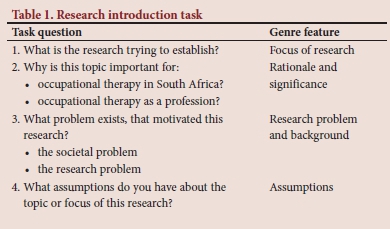Serviços Personalizados
Artigo
Indicadores
Links relacionados
-
 Citado por Google
Citado por Google -
 Similares em Google
Similares em Google
Compartilhar
African Journal of Health Professions Education
versão On-line ISSN 2078-5127
Afr. J. Health Prof. Educ. (Online) vol.13 no.4 Pretoria Dez. 2021
http://dx.doi.org/10.7196/ajhpe.2021.v13i4.1453
SHORT REPORT
Features of the research proposal genre made easy for undergraduate occupational therapy students
M C Ramafikeng
BSc (OT), MSc (OT), PhD (Ed); Division of Occupational Therapy, Department of Health and Rehabilitation Sciences, Faculty of Health Sciences, University of Cape Town, South Africa
Undergraduate occupational therapy programmes in South Africa require students to demonstrate competence in developing a research proposal and conducting the proposed research using appropriate methodologies.[1] Research methods, therefore, form a significant part of the curriculum. Groups of students are assigned a supervisor and research topic, and then embark on the research process. However, students generally perceive research as a daunting process. Some of the difficulties that the author has observed over the years resonate with those reported in the literature, such as limited understanding of the research process,[2] working in a group and handling group dynamics.[2,3] Students have also reported feeling overwhelmed by the increased workload associated with the research process, particularly when coupled with other course and life demands.[3] The research proposal is a genre, with specific textual features. Elements of the introduction part of the proposal that are often challenging for students are: (i) the focus of the research, which informs the background; (ii) the research problem; (iii) the rationale; and (iv) the significance of the research.
Approach
In preparation for the initial supervision meeting with the group assigned to the author, the students had to individually submit a written task. The task comprised questions outlined in Table 1.

Outcomes
Using accessible language made it easier for students to handle the textual features that define the structural form of an introduction to a research proposal. The supervisor facilitated a process of aligning students' responses with relevant textual features of the introduction. For instance, question 1 established the students' interpretation of the research focus. In the initial meeting, perspectives were shared, and through discussion, the group reached a common understanding. Responses to question 2 indicated the students' views of the importance and relevance/significance of the study, which motivated them to invest in the research process. Question 3 enabled refining of the research problem and differentiating between the broader societal problem and the specific problem that necessitated the research. Lastly, the assumptions shared for question 4 shed light on the researchers' positionality.
As an innovation in teaching, the task demonstrates a scaffolding approach that uses everyday language to facilitate handling of textual features of genre. Through this task, the supervisor introduced the proposal development process in a non-threatening manner that drew on students' prior knowledge. The outcome was early completion of the introduction of the proposal. Students stated that the task increased their confidence and facilitated group cohesion, and feedback from assessors of the proposal presentations indicated that the students were more eloquent about their research, and answered questions with greater ease.
Declaration. None.
Acknowledgements. None.
Author contributions. Sole author.
Conflicts of interest. None.
Funding. None.
References
1. South African Qualifications Authority. South African Qualifications Authority Registered Qualifications: Bachelor of Science in Occupational Therapy. Pretoria: SAQA, 2020. https://allqs.saqa.org.za/showQualification.php?id=3497 (accessed 12 October 2020). [ Links ]
2. Imafuku R, Saiki T, Kawakami C, Suzuki Y. How do students' perceptions of research and approaches to learning change in undergraduate research? Int J Med Edu 2015;6:47-55. https://doi.org/10.5116/ijme.5523.2b9e [ Links ]
3. Pearson RC, Crandall KJ, Dispennette K, Maples JM. Students' perceptions of an applied research experience in an undergraduate exercise science course. Int J Exercise Sci 2017;10(7):926-941. https://www.ncbi.nlm.nih.gov/pmc/articles/PMC5685073/ (accessed 10 November 2021). [ Links ]
 Correspondence:
Correspondence:
M C Ramafikeng
matumo.ramafikeng@alumni.uct.ac.za
Accepted 3 March 2021














